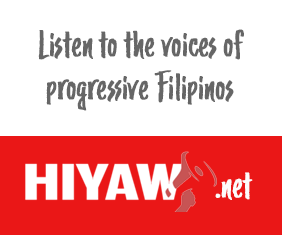International Coalition for Human Rights in the Philippines
Over the night of 21-22 September 1972, the dictator Ferdinand Marcos decreed Martial Law, ensuring that his Presidential term did not come to an end, allowing him to arrest his political competitors, and seize their assets.
Marcos had the blessing of US President Richard Nixon, under the pretext that Marcos was a strong ally against communism in the Cold War and in the last phase of the American War in Vietnam. US military bases at Clark and Subic enabled massive air and naval bombardment of Vietnam for years, as well as being notorious sites of sexual exploitation of women and children.
Indeed, Marcos used the then small but growing armed revolutionary movement led by the re-established Communist Party of the Philippines as a pretext for Martial Law, even though it was not an immediate threat to the Philippines state. That despicable figleaf of anti-communism is long gone as a cover for the present-day gross abuse of human rights.
Martial Law was a nightmare for the Filipino people of all classes, with arbitrary political killings, disappearances, torture, and political prisoner camps all over the country. The war against the Moro people raged in Mindanao. Trade unions and student campaigns were repressed
Under the earliest Structural Adjustment Program of the International Monetary Fund and the World Bank, Marcos created the world’s first Export Processing Zones with its tax holiday for foreign corporations, and “no-union, no-strike” rules. Marcos began state-sponsored export of labour. De-forestation was rampant, with consequences now evident in repeated flood and landslide disasters.
Dictator Marcos created the category of ‘crony capitalism’, and his cronies remain today as powerful economic and political players in the Philippines.
When Marcos had Senator Benigno Aquino Jr. assassinated on 21 August 1983 at the Manila International Airport, the simmering mass movement against the dictatorship erupted. By the end of 1985, he was forced to call a ‘snap election’ for 7 February 1986, which was won by a united opposition led by Mrs. Corazon “Cory” Aquino, mother of the current President. Marcos intended to fraudulently claim victory but was thwarted by an attempted coup which was itself saved by the famous “people power” uprising. The dictator fled to the protection of the US in Hawaii.
It was the Filipino people who removed the dictator in February 1986, with the sympathy of the world’s people, but without any help from the states who loudly proclaim their democratic credentials, in Europe, North America or the Pacific.
The euphoria of that democratic triumph was still echoing around the world, but in the Philippines it did not last long: KMU union leader and political figure Rolando Olalia and his driver Leonor Alay-ay were assassinated on 13 November 1986, protesting peasants were massacred at Mendiola on 21 January 1987, and BAYAN leader Lean Alejandro was assassinated on 19 September 1987. Reactionary groupings in the armed forces launched six coup plots against President Aquino, the most violent being in August 1987.
This powerful reassertion of military power in Philippines society, financed by US military aid, made the Cory Aquino presidency even worse than the Marcos era for cases of human rights abuse, despite its initial steps in releasing all political prisoners, declaring a revolutionary government until a new democratic Constitution was adopted by the people in February 1987, holding elections, and then making the profound decision by the Senate to reject any extension of the US Military Bases Agreement in 1991.
Today, 41 years later, the International Coalition for Human Rights in the Philippines calls the international community to attention for the shocking abuse of basic democratic and human rights that continue in the Philippines today. Despite a veneer of democratic institutions and elections, life for most Filipinos is one of grinding poverty, with all protests met with brutal force by the state – arbitrary execution, torture, arbitrary detention, judicial abuse, repression of the people´s organized actions.
Marcos casts a long shadow, but the international community can finally dispel it, in the bright light of scrutiny by civil initiatives, UN institutions and credible courts.
The Philippines is NOT a model of democracy. Following the steps of his predecessors, President Benigno Simeon Aquino III is implementing an undeclared Martial Law. The extrajudicial killing of 142 human rights advocates, political activists and development workers (and frustrated killing of 164 more), the 449 political prisoners being held in detention centres, the 16 cases of enforced disappearance, 76 cases of torture, 540 cases of illegal arrests and more than 30,000 victims of forced evacuation all attest to this reality. The impunity enjoyed today by the current Aquino presidency has its roots in US military aid now under the banner of ‘war on terror’, and the discredited ideology of unfettered ‘free trade and investment’ known as neo-liberalism or the ‘Washington Consensus’
This impunity must be ended by a combination of direct people’s action and state action.
Which government will be the first to refuse to have a state visit from President Aquino until General Palparan is put on trial for abductions and extra-judicial killings?
When will the the governments of the United States, Australia and other countries stop military aid and training to the Philippines until root-and-branch reform of the Armed Forces of the Philippines is under way?
Which government will call in the Philippines Ambassador to demand an end to repression of trade unions, farmers, student and other people’s organizations in the Philippines?
Which international figure will be the first to use their public standing to denounce the impunity of the Aquino presidency?
The International Coalition for Human Rights in the Philippines welcomes all organizations who share our passion for human rights and peace to join us in rising to this challenge.
Reference:
Canon Barry Naylor
Chairperson, Global Council
International Coalition for Human Rights in the Philippines (ICHRP)
Office: +44 (0) 116 261 5371
Mobile: +44 (0) 775 785 3621



